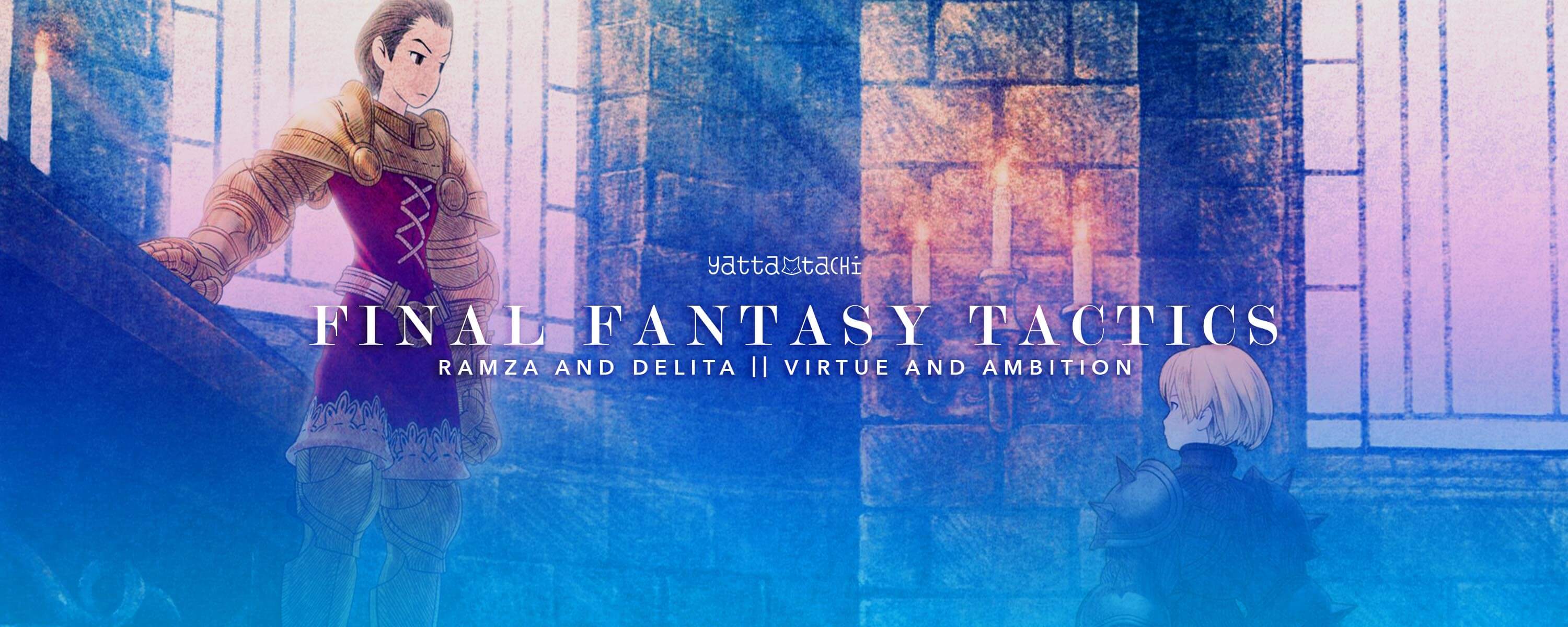Final Fantasy Tactics (and its remake, Final Fantasy Tactics: The War of the Lions) is my favorite Final Fantasy game. Yes, that’s right, not one of the numbered games (though this offshoot pays homage to them). Many gamers who grew up with the game can attest to how fun, in-depth, and yet broken it is. I can talk more about its gameplay, but this article is not about that. Instead, I will be telling you what I have learned about the two main characters, Ramza and Delita. These two characters are two sides of the same coin and they drive much of Final Fantasy Tactics’ plot. Though we play as Ramza, both of these young men are the true heroes of the game.
History
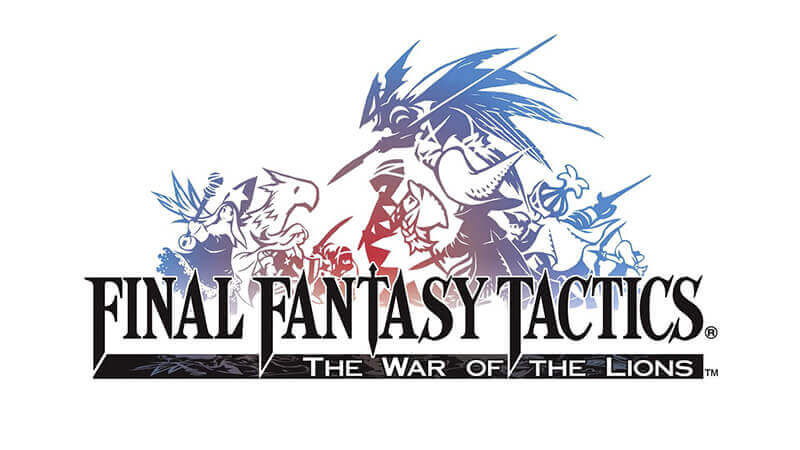
Final Fantasy Tactics arrived on PlayStation in 1997 (JP) and 1998 (US). Yasumi Matsuno, who is now famous for directing Ogre Battle, Vagrant Story, and Final Fantasy XII, designed much of the game mechanics. Playing this game was also the first time I noticed Akihiko Yoshida’s character designs and illustrations. Yoshida worked on Tactics along with Hiroshi Minagawa and Hideo Minaba, overseeing the visual art aspects.
Since its launch, the game has had critical success, with positive reviews and a broad following from the Final Fantasy fans as well as general JRPG players alike. I played Tactics on PlayStation when I was quite young and remembered the challenging battles, the amazing soundtrack by Hitoshi Sakimoto et al., and the unique art direction. I was not a Final Fantasy fan back then because I had not played any other FF titles prior.
In 2007, Square Enix released an updated version named Final Fantasy Tactics: The War of the Lions for the PlayStation Portable. It features movie scenes with new 3D models and voice acting, a few extra missions, new and improved localization, and a multiplayer mode. The same version has also been released on iOS and Android.
The Two Young Lions
Ramza Beoulve and Delita Heiral are the two major figures in this fantasy saga. Ramza is the straight-as-an-arrow protagonist, and Delita is the anti-hero and one of the morally complex characters. To understand their motives, we need to look back at their respective history and upbringing.
Blood is Thicker than Water
A major theme of the game is the struggle between the nobility in power versus the common folks in the unified kingdom of Ivalice. Within the kingdom are seven smaller ones fighting for control. At the beginning of the game, both Ramza and Delita are caught in the wars, trying to make ends meet as new military recruits. Ramza, along with his sister Alma, is from the House Beoulve, a noble lineage known for its loyalty and sense of justice. Delita and his sister Tietra, on the other hand, were from a poor farmer’s family. Ramza’s father adopted both of them into the House Beoulve.
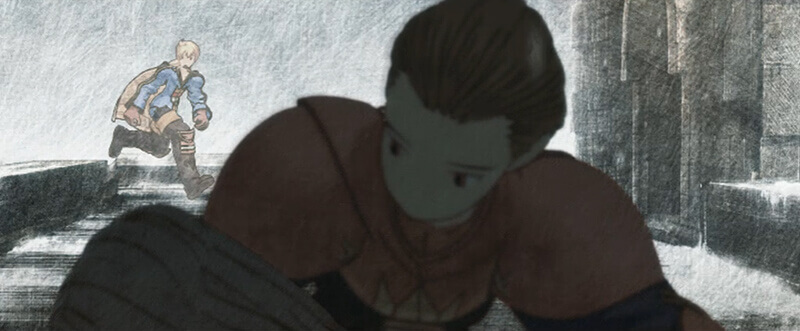
In a series of missions, Ramza and Delita are caught in fights between a noble rebellion group and other nobles. On many occasions, a certain noble figure belittles Delita for his commoner lineage, which usually ends up with Ramza defending his friend. Somewhere along the line, a misunderstanding happens and Tietra is kidnapped because other nobles think she is an aristocrat worthy of being a bargaining chip. After a complicated sequence of rescue missions and battles, Tietra dies, despite Ramza and Delita’s best effort. Shortly after, Ramza witnesses an explosion engulfing Delita and Tietra. Many people, including Ramza, think that was the end of the two siblings. That concludes the first chapter of Final Fantasy Tactics.
Sometime later, Ramza meets again with Delita, surprised to see his best friend still alive, albeit as a changed man. By then, Ramza has left House Beoulve and has vowed to uphold his own justice by helping people. On the other hand, Delita has forged an ambition to rule over Ivalice and to rid it of impure nobles, seemingly out of spite and revenge.
Two Sides of the Same Coin
“Though our methods may be different, our goals are not. As long as they remain so, you are no enemy of mine.” — Delita Heiral
In a classic tale of two people striving to achieve peace through different means, Ramza and Delita agree to disagree. The two friends try to persuade each other to stand down, even though both understand one another’s point of view. Delita walks the path above, trying to portray himself as the hero that the people deserve, while plotting sinister moves behind the curtain. On the flip side, Ramza opposes the power structures by fighting alongside the people and uncovering dark agendas by the powerful Church of Glabados. By the end of the game, the history records praise Delita as the peace bringer and shun Ramza as the heretic branded by the Church. Through playing the game, you will find that this is far from the truth.
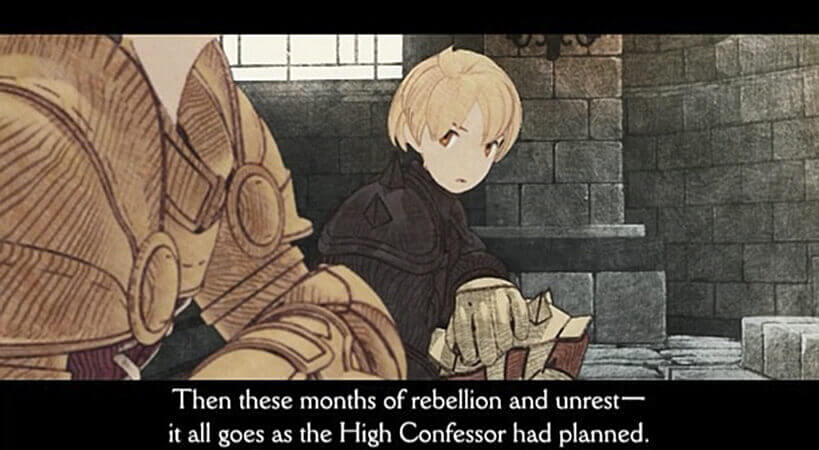
Ramza, through his limited conversations with Delita, seemingly allows himself to be used by his friend just so they both can get rid of the corrupted factions. Delita, after admitting that he is using Ramza, shows little remorse for his plans. Their strategies, actions, and conflicting convictions have become far too large for either of them to back down. They are, in their own eyes, the justice Ivalice needs in this chaotic time.
From my perspective, the two heroes need each other in order to change Ivalice.
The Sum of the Differences
It is not hard to see what shapes Ramza’s and Delita’s two distinct drives. Ramza’s impetus initially comes from the House Beoulve’s legacy of being a morally right family. As time goes on, Ramza realizes how much suffering and wrong is in Ivalice. He treads his path and sets his sights to help the people, because that is what he wants. As many players have noted, he is the embodiment of Virtue.
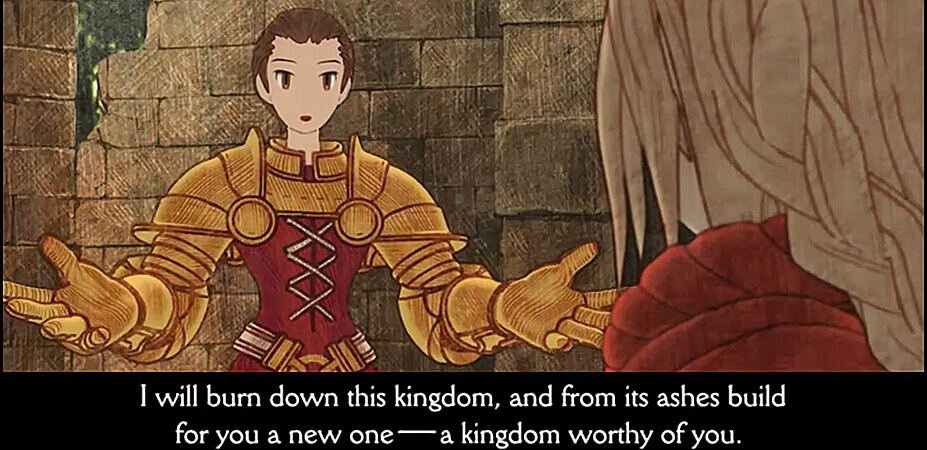
Delita is also trying to do the right thing, but his newfound conviction is shaped by forces which acted upon him. Nobles belittled his commoner heritage and used him and Tietra for their gains, resulting in Tietra’s undeserved death. However, later on in the story, Delita also fights to protect Princess Ovelia. She is a powerless individual in the kingdom of Ivalice, but holds an important position as the next in line to the deceased king. He cares for the princess, yet he still uses her to grant himself the status of a king towards the end of the story.
Despite everything Delita does, you can easily sympathize with his misfortune and desire to right the wrongs. His core value is a little hard to pinpoint because he is such a complicated person, but I think he is the embodiment of Ambition. I find myself rooting for both, yet am torn by Delita’s rather unscrupulous plans.
There are occasions when the two fight side-by-side, both to protect their own plans and one another. Indirectly, Delita assists Ramza by sending a few high profile personnel to aid Ramza’s cause. A noble and legendary war hero (also a very powerful character you get to play), Cidolfus Orlandeau, is a powerhouse that helps Ramza’s crusade. In turn, our protagonist helps Delita’s plan by battling many of their mutual foes.
In closing, the wish to do good will bear no result without a strong drive. An ambition to succeed needs to be monitored by a moral compass. It is only by keeping both values in balance that one can be able to create a positive change. I believe this is what Final Fantasy Tactics wants to show us with its dual protagonist setting.

Featured Sponsor - JAST
The sweetest romance and the darkest corruption, the biggest titles and the indie darlings; for visual novels and eroge, there's nowhere better.
Big thank you to our supporters
From their continous support, we are able to pay our team for their time and hard work on the site.
We have a Thank-You page dedicated to those who help us continue the work that we’ve been doing.
See our thank you page